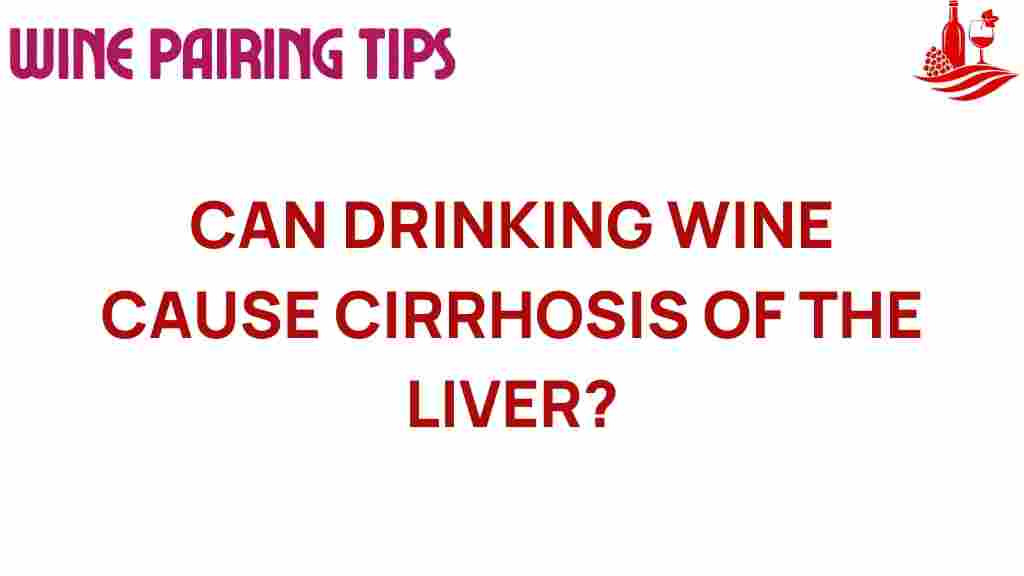The Hidden Risks: Can Drinking Wine Lead to Cirrhosis of the Liver?
Wine has been celebrated for centuries, often associated with relaxation and social gatherings. However, as with many indulgences, there are hidden risks, particularly when it comes to liver health. One of the most concerning conditions related to excessive alcohol consumption is cirrhosis of the liver. In this article, we will explore the connection between wine consumption, cirrhosis, and liver disease, highlighting health risks, symptoms, and preventive measures based on recent research.
Understanding Cirrhosis and Its Connection to Wine
Cirrhosis is a late stage of scarring (fibrosis) of the liver caused by many forms of liver diseases and conditions, such as hepatitis and chronic alcohol abuse. When the liver is damaged, it tries to repair itself, leading to the formation of scar tissue. As cirrhosis progresses, the liver becomes severely impaired, affecting its ability to function properly.
The primary risk factor for developing cirrhosis is chronic alcohol consumption, which includes wine. While moderate drinking may not pose significant risks for most people, excessive or prolonged consumption can lead to severe liver damage. Understanding the relationship between wine and cirrhosis is crucial for maintaining liver health.
The Role of Alcohol Consumption in Liver Disease
When we talk about alcohol consumption, it’s important to distinguish between moderate and excessive drinking. The Centers for Disease Control and Prevention (CDC) defines moderate drinking as up to one drink per day for women and up to two drinks per day for men. Exceeding these guidelines can increase the risk of developing liver disease, including cirrhosis.
- Moderate Drinking: Generally safe for most adults.
- Excessive Drinking: Defined as more than the moderate drinking guidelines.
- Binge Drinking: A pattern of drinking that brings blood alcohol concentration to 0.08% or higher.
Health Risks Associated with Drinking Wine
While wine, particularly red wine, is often touted for its potential health benefits – such as antioxidants and heart health – it’s crucial to recognize the potential health risks of excessive consumption. Here are some significant health risks associated with drinking wine and other alcoholic beverages:
- Liver Disease: Chronic consumption can lead to fatty liver, alcoholic hepatitis, and eventually cirrhosis.
- Dependency: Increased tolerance can lead to alcohol use disorder.
- Increased Cancer Risk: Alcohol consumption is a risk factor for various cancers, including liver cancer.
- Cardiovascular Issues: Excessive alcohol can lead to high blood pressure and heart disease.
Symptoms of Cirrhosis
Recognizing the symptoms of cirrhosis early can be crucial for effective management and treatment. Symptoms may vary, but common signs include:
- Fatigue and weakness
- Itchy skin
- Easy bruising and bleeding
- Jaundice (yellowing of the skin and eyes)
- Swelling in the legs and abdomen
- Confusion or difficulty concentrating
If you experience any of these symptoms, especially if you consume wine or other alcoholic beverages regularly, it’s essential to consult a healthcare professional.
Research on Wine and Liver Health
Recent research has provided insights into the effects of wine on liver health. Studies indicate that:
- Moderate wine consumption may have some protective effects against certain diseases, including cardiovascular disease.
- However, the risks of liver disease, including cirrhosis, significantly increase with heavy alcohol consumption.
- Research suggests that the type of alcohol consumed (whether wine, beer, or spirits) may have different impacts on liver health, but the quantity consumed is a more critical factor.
For more detailed information on alcohol and liver health, you can refer to resources such as the National Institutes of Health.
Prevention Strategies for Liver Health
Preventing liver disease, especially cirrhosis, involves making informed decisions about alcohol consumption. Here are some effective strategies:
- Practice Moderation: Stick to the guidelines for moderate drinking to minimize risks.
- Stay Hydrated: Drink plenty of water, especially if consuming alcohol.
- Eat a Balanced Diet: Focus on whole foods, fruits, vegetables, and lean proteins to support liver health.
- Regular Check-Ups: Get regular health screenings to monitor liver function.
- Educate Yourself: Stay informed about the risks of alcohol consumption and liver disease.
Step-by-Step Process for Reducing Alcohol Consumption
If you’re concerned about your alcohol consumption and its impact on your liver health, here’s a step-by-step approach to help you reduce your intake:
- Assess Your Current Drinking Habits: Keep a diary of your alcohol consumption for a week.
- Set Clear Goals: Decide how much you want to reduce your consumption.
- Choose Alcohol-Free Days: Designate certain days of the week as alcohol-free.
- Find Alternatives: Explore non-alcoholic beverages or low-alcohol options.
- Seek Support: Consider joining a support group or talking to a healthcare provider.
Troubleshooting Tips for Alcohol-Related Issues
If you or someone you know is struggling with alcohol consumption, here are some troubleshooting tips:
- Identify Triggers: Recognize situations that lead to increased drinking and find alternatives.
- Develop Coping Strategies: Find healthy ways to cope with stress, such as exercise or mindfulness.
- Communicate: Talk to friends and family about your goals for reducing alcohol consumption.
- Professional Help: Don’t hesitate to seek professional help if you feel overwhelmed.
Conclusion: Making Informed Choices About Wine and Liver Health
While drinking wine can be part of a balanced lifestyle, it’s vital to recognize the potential health risks associated with excessive consumption, particularly concerning liver disease and cirrhosis. Understanding the symptoms, prevention strategies, and recent research on alcohol is essential for making informed choices.
By practicing moderation, staying educated, and seeking support when needed, you can enjoy wine responsibly while safeguarding your liver health. Remember, your liver plays a crucial role in your overall well-being—making mindful decisions about alcohol consumption today can lead to a healthier tomorrow.
For more information on liver health and prevention of liver disease, visit our health resources page.
This article is in the category Tips and created by Wine Pairing Tips Team
